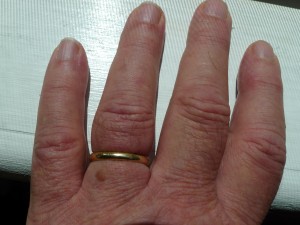A current reflection on a passage from an old book of mine, Dark Eros.

Repression of the Sadeian imagination is a weak attempt to live without bondage, to be free of ties to ordinary life, to find some spiritual way that flies without strings attached Again and again religious literature of many traditions warns precisely against “attachment” a euphemism for bondage. . . .
The person who has dreams and fantasies of bondage, who experiments with bondage in sex, and who gets stuck in painful and disturbing relationships where power is a major problem may need to reflect upon the necessity of being tied to life and fate. Symptomatic bondage suggests a need for submission to eros, to life, to another person. . . . Being attached to the soul, to life, to destiny, to others, to place, to family or to talent is the kind of submission, limitation, and harnessing that allows desire to perform its rituals of exploration and that invites effective power. Without this bondage, human effort is Promethean, godless, off track and soulless. Thomas Moore, Dark Eros, pp. 140-41
Many years ago when I was in my thirties and trying to become a decent therapist and especially deal with issues of aggression and anger, the Jungian analyst and professor of myth Rafael Lopez-Pedraza suggested that I read the Marquis de Sade. Once I got an appreciative angle on Sade, I found him to be full of insight into the dark aspects of human desire, among them the habit we have of finding pleasure in being bound or loving leadership and authority.
We take a job and immediately learn the rules that will bind us as long as we work at that place. We have to wear certain clothes, show up at exactly the right time, clock in for a precise number of hours, perform certain duties and subject ourselves to examination, search, overview, criticism and penalties. That’s the way life is, isn’t it? We get the job and go home to family and friends to celebrate. We’ve entered a new strict bondage, the kind that Sade would approve, and there is pleasure in it.
Today we wonder why employees go berserk and shoot their employers or fellow workers or why students shoot up our schools. It makes no sense. Why these places where such good things are happening? But of course these very places are scenes of bondage and cutting criticism every day.
I like to distinguish between sadistic and Sadean. Sadean is simply the law of life by which we suffer for our own good and inflict pain on others for their well being. A surgeon and a dentist don’t hesitate to examine and puncture our bodies, though they do try to alleviate the pain as much as possible. Teachers make us read things we’d never read otherwise and take exams and be graded and pay a good price for it all.
But this Sadeian aspect of every part of life can easily slip over into excessive, unnecessary and punitive suffering. Teachers, parents and even doctors can lose sight of what they’re doing and become sadistic, satisfying some deep urge in themselves to inflict pain. Each of us has to be alert to this tendency to become the source of pain that appears when we have gone too far, crossed a line, and moved from otherwise creative and acceptable suffering to actual cruelty.
It’s easy for the best of us to forget and become unconscious and indulge in small acts of literal aggression. Animals and children are often the objects of this cruelty because they are especially subject to our control. Notice, by the way, how the word “subject” is Sadeian.
I’m writing this at a time of national elections. Here, too, we have to be cautious lest our natural and creative instinct to subject ourselves to a good leader slips into a masochistic desire to be manipulated. We might enjoy hearing a candidate express his tough intentions because neurotically we feel a need to be controlled and perhaps abused. These issues are so subtle that they can be in full bloom without our ever suspecting them.
This odd Sadean aspect of human experience is full of paradoxes. If you find yourself being too tough with your children (sadism), becoming weaker is exactly the wrong thing to do. You correct sadism by becoming more deeply and more wisely in control and exercising deep power of character rather than literal, external manipulation. If you tend to submit too readily and fully to someone else’s power, don’t try to be tough yourself. Learn how to be effectively dependent and compliant without losing your power. Sadism and masochism shift back and forth into each other. You don’t want to be at either extreme.
The Sadean desire for power and comfortable submitting allows life to be creative. Without it we couldn’t educate and heal each other. But every day we find ourselves walking a tightrope, a delicate balance, where it is easy to fall off into a condition where we allow too much or let our power become cruel.











